Antropyton
Saturday, April 29, 2006
Friday, April 28, 2006
Body redefinition & new social statuses.
My reading of Das is that the emergence of discipline of geriatrics has brought about new definition of a healthy and “normal” body and has caused confusion between individual and social identities. It has also created a new category of sick people – the older ones. New definition of health has caused that aging has been reconceptualized as a disease and the ideology of the perfectly ordered body, which can be achieve through medicaments, as a sign of normalcy dominates the image of life cycle. Behaviour and health conditions, once normal and even noble (Kawagley, Turnbull), have been transformed to disability and this one to sickness that requires medical treatment. Due to dominant ideology in which there is no place to age dominated weakness both bodies and minds of the older are going through radical transformation. It has shaped difficulty with maintaining definitive boundaries between “the normal” and “the pathological”. The old do not feel as they feel but often as they are told to feel. They have to redefine their self and body images and this redefinition concerns the individual body as well as social one. This is another aspect of medicine as a power. Modern welfare state intervenes not only in social space and the economic cycle but also in the life cycle. This kind of total and often brutal medicalization and hospitalization in the contemporary world has also changed our images about the successful life and made health to be one of the determinant of social status. And this status is seen rather as achieved than ascribed one (Scheper-Hughes & Lock 1987: 25). Health designates success while sickness is a failure. Susan Sontag writes about shame and social ostracism that follows for instance getting a cancer diagnosis.
The story of the disaster in
To exemplify how policies make use of property of new knowledge Das uses body politics in
references without links:
Friday, April 21, 2006
Wiadomosc technicza.
- spitsbergen
- oslo
- berlin
- zielona gora
- 10.06 jakas wiocha pod zielona czyli weselicho (nie moje)
- poznan
- gdansk
- inflanty
- pulawy, kazimierz
- lublin (szakira gdzie ty mieszkasz jak jestes tu?? a poza tym jak masz na nazwisko??:)
- wroclaw
- zielona gora
- berlin
- 06.07 oslo
- i zyli dlugo i szczesliwie pracujac na skøyen...
Ignorance on all fronts. 4th power HAS a power.
It was two years ago. New Chech Republic and Slovakia are two years older. But nothing has changed. I've got used to ignorance of people that are around me. But today I stopped wondering why these people do have difficulty in remembering what countries are in Europe. I do not demand knowledge of history, I am not a historical genius neither. But how can they say that "Praha is so in" when they don't know the name of the country? I hope they do take a passport when going shopping to this "coolest capital of Europe".
So today I've read an article in Aftenposten, the most influential and opinion-forming newspaper in Norway. As I had noticed elsewhere paper's catchword is "it's good to know". Today I've read that:
(...) Den skriftlige protesten er undertegnet av 11 andre land i tillegg til Storbritannia, nemlig Argentina, Australia, Belgia, Brasil, Frankrike, Nederland, New Zealand, Spania, Tsjekkoslovakia, Tyskland og Østerrike.
Speechless.
If I had read Aftenposten everyday I would probably have thought that Chechoslovakia is a beautiful country in Eastern Africa or in Malaysia... Oh no, I am sorry, I have never heard about Norwegian aid there. Yeah, that's why I don't know what the hell Chech Republic is.
Wednesday, April 19, 2006
To safeguard (mini)tradition.
Emigration makes people create their own world. They create new networks that should mirror what we had been used to before moving abroad. On the other hand these new connections are made to find ourselves in this new geographical and social space. And to prove that we are going to manage new dimension, new life. In the naive belief we try to break away from a group we had belonged to. This ambiguity is an inextricable part of every emigrant's life. We have to remember that majority is not coming abroad with specified aims. Paradoxically shapelessness of our expectations, hopes and images does shape us.
In quest for a feeling of belonging we make connections. Relations. Network. Forced community. Unfortunately, with the passing of time these synthetic fibres are not enough...
Ok, I've just realized that I am not writing about what I had planned to do. Nevermind. What I wanted to mention is that I've really understood what social scientists call for tradition's rebirth. I've understood the emotional behind revival movements (for once without digressions about politics and my obsessive talking about groups of interest). I've understood that traditions can survive without Tradition. Continuity without faith and will to continue.

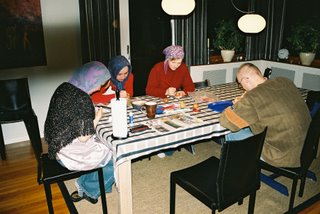
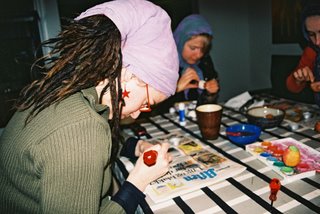
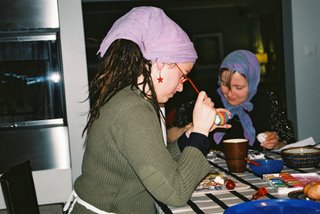
Wednesday, April 12, 2006
The prevalence of the extraordinary.
 Show me your metro station and I will tell you where you are from... Ok, I do really love pictures of metro/rail stations, believe it or not they tell a little bit about country, people, even politics. (Yeah, overinterpretation, but if it is argued that architecture is a mirror of social mentality, an expression of collective attitudes of the time, why the "law" architecture can't be such a reflection? I don't mean the carbon copy, the "high" architecture is not such either, but it can provide a good starting point to reflect on society.) Funny? Untrue? Boring? Maybe. But have you never tried to figure out what kind of people are waiting at this or that platform? They do not use the place in a way the tourist or the strange enthusiasts of the oridinary do. Whereas those places are only components of their lives, parts that are used to being thrown away from the conscious memory and do not attract our attention, the strangers watch eagerly every movement of the air. We rush through this day-to-day reality without reflecting over all this stuff that the strangers do. I am really fascinated, and worried, with how we miss the essential in our everyday life.
Show me your metro station and I will tell you where you are from... Ok, I do really love pictures of metro/rail stations, believe it or not they tell a little bit about country, people, even politics. (Yeah, overinterpretation, but if it is argued that architecture is a mirror of social mentality, an expression of collective attitudes of the time, why the "law" architecture can't be such a reflection? I don't mean the carbon copy, the "high" architecture is not such either, but it can provide a good starting point to reflect on society.) Funny? Untrue? Boring? Maybe. But have you never tried to figure out what kind of people are waiting at this or that platform? They do not use the place in a way the tourist or the strange enthusiasts of the oridinary do. Whereas those places are only components of their lives, parts that are used to being thrown away from the conscious memory and do not attract our attention, the strangers watch eagerly every movement of the air. We rush through this day-to-day reality without reflecting over all this stuff that the strangers do. I am really fascinated, and worried, with how we miss the essential in our everyday life.So today I've found some pictures of my everyday humdrum taken from totally new perspective. And they've shed light on how my perception has been reduced. When we are looking at the picture the mundane in a way becames the sacred, the mystique, the dream of all those who have got used to. We miss place we do not know, I miss them! And I thought that now when I do not notice movement of the air any more, I do have to accustom my eyes to the darkness. This is the only way to survive boths as an ethnographist and as a human.
It is so easy to forget that there will not be any palace without striking the match.
And here is my day-to-day magic, step by step...station by station...
Give me yours then.
Sunday, April 09, 2006
Catalonian street art or art of street selling?
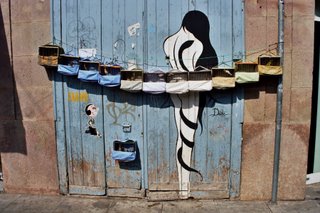
So, what about using nature (birds) to create a culture? Do they still belong to nature or they have been transformed into culture due to having been transformed into art? Have they ever been nature? I do not know if somebody wanted to sell the birds or if it was just expression of somebody's aesthetic views. But still, these birds are there.
Question: what statements about our attitudes can be done when the boundaries are unknown? Chewong, a small group of aboriginal people of the Malay tropical rainforest, do not differentiate between these two in a way we do. Their culture is built upon nature, as all are supposed to be, but they do not make distinction between these two dimensions. In a context of modern (or postmodern?) art we are like Chewong and others. But, there is culture that has imported what before had been reserved to the natural domain. And we do remain this classification despite proving all over again that "there are no boundaries any more!". The fact that they do not exist ANY MORE indicates something.
I think it is worth to research the art performances in a way they use both the natural symbols and objects. In this case, nature in the popular meaning has been reduced to an object. How we perceive performances as this one, depends on our perceptions of this object. Or in other words - if we perceive the birds as an object or as a manifestation of nature. And why do we still try to prove the holistic worldview which is actually against our "nature"?
Friday, April 07, 2006
Eugenijus Ališanka and my thoughts
the capitals of empires all smell of spices: bay leaves, black pepper, bergamot
in the middle of the square crystal water pours forth from the lions' jaws
in the architecture one can decipher
the palimpsest of proud loneliness and ennui
the heat of the siesta and the sherry awaken my imagination:
i see the first signs of desire in a girl's face
i already know how it will all end
i will metamorphose into a bull and
i will carry her away to the curonian lagoon
the daughter of toreadors and the mother of my poems
she will bear nation upon nation and my blood will flow
in the veins of the vysla and the nemunas
a lot will happen in my lifetime –
there will be wars and there will be famine
i will betray others and will be betrayed
i will stroll through cities in undarned socks
i will visit my sons-in-law all over europe
mayors heads of state street girls
a lot will happen but i know it will end well
as all journeys do in the land of morpheus
"in the middle of the afternoon i sat with my friend don quixote in a café and sampled sherry"
Gastro-nationalism in Catalonia.
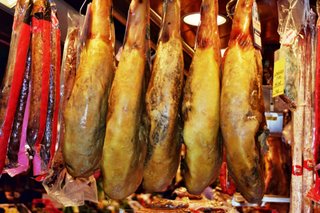
More about this term and it's author: here.
Wednesday, April 05, 2006
Propozycje do MA
1. "When flash becomes meat" - czyli o transformacji natury w kulture. + wplyw religii na postrzeganie tego procesu. Chrzescijanska hierarchia swiata (czlowiek:zwierze), ktora ladnie wylozyl Thomas Keith a panteizm Mosquito. Inspiracja: Animal to edible. Miejsce: rzeznia. Miejska czy na wsi? Minus - dostep do danych, wiekszosc musialaby sie opierac na zaplanowach wywiadach. Nie wiem czy znioslabym polroczne przebywanie wsrod miesa - smrod moglby mnie zabic.
2. "Risk management" - czyli jak mieszkancy okolic wulkanicznych postrzegaja ryzyko katastrof naturalnych, zycie przy aktywnych wulkanach itp. Niestety mogloby to przypominac prace Eline Stangeland z 2004, w ktorej pisala wlasnie o pojmowaniu ryzyka i tozsamosci miejsca na Islandii. Zeby nie zrobic powtorki z rozrywki musialabym polozyc nacisk na stosunek nikaraguanczykow do tzw. wiedzy ekspertow. Czyli pokazac zwiazki miedzy wiedza lokalna a ekspertyza naukowa. Moglabym to tez powiazac z antropologia medyczna - definicja zdrowia itp. Ewentualnie rozwazyc porownanie podejscia do zanieczyszczen naturalnych (pyl wulkaniczny) i nienaturalnych (czyli calego fabrycznego swinstwa:). + reakcja na przymusowe przesiedlenia. Plus - troche Mary Douglas. Minus - nie wiem czy nie pisze sie o tym za duzo. Prawdopodobnie duzo siedzenia w dokumentacjach medycznych i ekologicznych.
3. Nie moge przestac myslec o Life Exposed : Biological Citizens after Chernobyl Adriany Petryny. Moze wiec jakies studium miejskie? Choc niekoniecznie przeciez. Musialabym zbadac katastrofy ekologiczne. Dobry pretekst by wspomniec o teori przejecia wladzy nad naszymi zmyslami. Plus - duzo Mary Douglas. Minus - Ulrich Beck musialby przemowic, a nie wiem czy mam ochote z nim znow dyskutowac. I zbyt duzo politycznosci.
4. Inspiracja: "The meaning of water" - mowi samo za siebie. Czyli o wszelkich aspektech wody, ktorej maja tam duzo heh. + ewentualnie podejscie do jej prywtyzacji, jesli ten temat nie zostal juz doszczetnie wyczerpany (przepraszam od razu panow z instytutu, ktorzy uwazaja, ze ZADEN temat nie jest wyczerpany, a zaden ekosystem zbyt maly by go zbadac:) Minus - obszernosc i mozliwosci tematu moga stanowic zagrozenie dla moich Dänikenowskich tendencji:) A powaznie to skoncze potem.
Tuesday, April 04, 2006
Zacmienie. Augusto Monterroso
"Cuando Fray Bartolomé Arrazola se sintió perdido aceptó que ya nada podría salvarlo. La selva poderosa de Guatemala lo había opresado, implacable y definitiva. Ante su ignorancia topográfica se sentó con tranquilidad a esperar la muerte. Quiso morir allí, sin ninguna esperanza, aislado con el pensamiento fijo en la España distante, particularmente en el convento de Los Abrojos, donde Carlos Quinto condescendiera una vez a bajar de su eminencia para decirle que confiaba en el celo religioso de su labor redentora.
Al despertar se encontró rodeado por un grupo de indígenas de rostro impasible que se disponían a sacrificarlo ante un altar, un altar que a Bartolomé le pareció como el lecho en que descansaría, al fin, de sus temores, de su destino, de sí mismo.
Dos horas después el corazón de fray Bartolomé Arrazola chorreaba su sangre vehemente sobre la piedra de los sacrificios (brillante bajo la opaca luz de un sol eclipsado), mientras uno de los indígenas recitaba sin ninguna inflexión de voz, sin prisa, una por una, las infinitas fechas en que se producirían eclipses solares y lunares, que los astrónomos de la comunidad maya habían previsto y anotado en sus codices sin la valiosa ayuda de Aristóteles."
Sunday, April 02, 2006
Pare mysli o Barcy
2. Obecnosc kobiet na meczu futbolowym i ich aktywnosc tamze zachwialy tez moim, wlasciwie nie uzasadnionym niczym konkretnym, wyobrazeniem o poludniowej macho-kulturze i tamtejszym nie-rodzinnym patriarchalizmie. Lub odwrotnie: pilka nozna w Katalonii nie jest domena mezczyzn.
3. Prawda, mowi sie rowniez o silnej pozycji kobiety w rodzinie. W pewnym momencie w historii nauki o rodzinie nastapila schizma. Podzial na wyznawcow poludniowego patriarchalizmu lub tych co uznaja matriarkalny schemat rodziny za obowiazujacy. Bedac krotko, za krotko by wypowiadac jakiekolwiek sady na temat Katalonii, a poludnia tym bardziej, moge mimo wszystko uznac obie prawdy za watpliwe. Nie, nie podwarzam niczego. Zastanawiam sie tylko dlaczego nikt (jesli ktos jednak sie spotkal z tym - dajcie znac) nie staral sie znalezc tak zwanego zlotego srodka? Przeciez model rodziny nie musi byc ani bialy ani czarny. Dlaczego w naukach brakuje szarosci? Owszem, mowi sie o "problematycznosci" i "zlozonosci" tego tematu, ale dlaczego tak bac sie wyposrodkowania? Mezowie krzycza na zony i podkreslaja, kto jest panem, zony piszcza na mezow, ktorzy robia co zona nakarze. Przepraszam za uproszczenie, ale jak inaczej zilustrowac w jednym zdaniu czym jest wladza w rodzinie?
4. W Barcelonie pachnialo mi tez islamem. Nie wiem czemu, ale to miasto dla mnie mogloby byc muzulmanska metropolia. Nie zdziwiliabym sie gdybym nagle uslyszala nawolywania z ktoregos z meczetow. Moze to przez palmy, moze przez te orientalne ornamenty, ktore co rusz wylanialy sie z ukrycia, moze znajomosc historii, a moze po prostu bym tego chciala...
5. Ile oni tam pala!!! Ach, jak dobrze bylo odpoczac od tego landrynkowego tutejszego zdrowia...
"I'm going to Europe". Well, what DOES it actually mean?
Pare wrazen: ciasne mieszkania z widokiem na sciane. Mieszkanie w kolektywie jest niezwykle popularnym rozwiazaniem nawet dla starszych - w Norwegii i w Polsce malzenstwa rzadko decyduja sie na takie warunki. Latynosi na budowach. Na mecz FCB przychodzi mnostwo starszych pan a panowie na nie nie krzycza a nawet z nimi dyskutuja na temat tego co sie dzieje na boisku. Hiszpanie mowia ciszej niz sie spodziewalam. Maly respekt dla prawa. Czuc katalonska dume. Punkowcy bardziej ruchliwi huehue. Zapach moczu i psa. Lingwistyczne odrodzenie. Wciaz nie umiem poslugiwac sie EURO. Poczucie, ze jeszcze wiecej przed nami. Nawet juz wiem co dalej.
Stworz swoja mape Europy
Mapy polityczne Europy kojarza mi sie zawsze z atlasem historycznym, a dokladniej z wojnami, przemarszami wojsk lub ogolnymi strategiami militarnymi. Wam nie? Ta na przyklad wyjatkowo kojarzy mi sie z bitwa pod Stalingradem, nie wiem czemu. Albo z jakims absurdalnym rozkladem chmur komunizmu. Przerazila mnie ta mapa. Widmo Pokoizmu jakies takie niemrawe...
